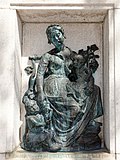Gustav von Bunge
Gustav Piers Alexander Bunge (born January 7, jul. / 19th January 1844 greg. In Tartu , † 5. November 1920 in Basel ) was a Baltic German physiologist and professor at the University of Basel .
Life
He was born in Dorpat (then Russia, now Tartu, Estonia) as the son of the German-Baltic scholar family Bunge . His father Alexander von Bunge was an explorer and professor of botany at the University of Dorpat . Gustav's uncle Friedrich Georg was a legal historian and professor in Dorpat. Gustav's brother Alexander was a doctor, explorer and zoologist. Between 1886 and 1889 the University of Dorpat , which had been German since 1802, was uncompromisingly Russified.
After studying chemistry and mathematics in Dorpat , Gustav von Bunge received his doctorate in 1874 and qualified as a professor in physiology . After studying medicine in Strasbourg and Leipzig , he received his doctorate in medicine in Leipzig in 1882. From 1874 to 1885 he was a lecturer in Physiological Chemistry at the Department of Physiology at the Medical Faculty of the University of Dorpat. In 1885 he became an associate professor and , from 1886 until his death in 1920, a full professor of physiological chemistry at the University of Basel . His inaugural lecture The Alcohol Question on November 23, 1886, in which he spoke out against alcohol consumption and alcohol production, caused a sensation and was translated into sixteen languages. It formed the basis of the scientific abstinence movement and health-oriented alcohol policy. The 1887 printed lecture The alcohol question drew Gerhart Hauptmann in 1889 in the design of his drama Before Sunrise zoom and quoted from it in the dramatic text. In 1888 Bunge was elected a member of the Leopoldina Academic Academy .
His interest was not limited to the natural sciences; History and social sciences preoccupied him since the student years. So he became a staunch supporter of the American land reformer Henry George . From his calculations on the cost of alcohol production, he switched off the traditional production factor capital, since this can be traced back to the original factors of land and labor.
In 1887 the first edition of his main text book on physiological and pathological chemistry appeared . Bunge (and his student Nikolai Lunin ) are considered to be the pioneers of vitamin research . As a social hygienist, he was anti-mechanistic in scientific thinking. He turned against the diseases of civilization , advocated women's studies and became popular through his work on abstinence and milk research. In 1890 he became an honorary citizen of Basel.
He died on November 5, 1920 in Basel. On November 8, 1920, he was buried in the Wolfgottesacker in Basel. His grave is tended to this day.
Trivia
Bunge was the originator of the assumption that spinach is conducive to muscle building due to its particularly high iron content. However, the value of 35 mg iron determined by Bunge in 1890 related to 100 g spinach powder and was thus 10 times higher than the iron content of fresh spinach.
Fonts (selection)
- On the importance of table salt and the behavior of potassium salts in the human organism Mattiesen, Dorpat 1873 ( digitized edition of the University of Tartu ).
- The potassium, sodium and chlorine content of milk compared with that of other foodstuffs and the total mammalian organism Mattiesen, Dorpat 1874 ( digitized edition of the University of Tartu ).
- Vitalism and Mechanism: A Lecture. FCW Vogel, Leipzig 1886. Complete digital copy from HAAB Weimar
- Textbook of physiological and pathological chemistry . Leipzig 1887; 4th edition: FCW Vogel, Leipzig 1898 ( digitized edition of the University and State Library Düsseldorf ).
- The alcohol question: a lecture. FCW Vogel, Leipzig 1887; most recently :oholgegner-Verlag, Lausanne 1941 ( full text ).
literature
- Caroline Jagella Denoth: Bunge, Gustav von. In: Historical Lexicon of Switzerland ., 2003.
- Christian Nottmeier and Claus-Dieter Osthövener (eds.): " Adolf von Harnack's correspondence with Gustav von Bunge". In: Journal for the recent history of theology. ISSN 0943-7592 , Vol. 12, 2005, pp. 287-340.
- Gerhard Schmidt: The spiritual legacy of Gustav von Bunge . Dissertation, Medical Faculty, University of Basel, 1973.
- Marie-Louise Portmann: New aspects on the biography of the chemist Gustav von Bunge, from his written estate, Swiss Journal of the history of medicine and sciences, Vol. 31, 1974, pages 39-46
Web links
- Literature by and about Gustav von Bunge in the catalog of the German National Library
- Publications by and about Gustav von Bunge in the Helveticat catalog of the Swiss National Library
- Gustav von Bunge's estate in the Basel University Library
- Album academicum of the Imperial University of Dorpat , Dorpat 1889
- biography
- Baltic Historical Commission (ed.): Entry on Gustav von Bunge. In: BBLD - Baltic Biographical Lexicon digital
| personal data | |
|---|---|
| SURNAME | Bunge, Gustav von |
| BRIEF DESCRIPTION | German-Baltic physiologist and professor |
| DATE OF BIRTH | January 19, 1844 |
| PLACE OF BIRTH | Dorpat |
| DATE OF DEATH | 5th November 1920 |
| Place of death | Basel |



